“Face of the Enemy”
Written by Rene Echevarria and Naren Shankar
Directed by Gabrielle Beaumont
Season 6, Episode 13
Production episode 40276-240
Original air date: February 8, 1993
Stardate: 46519.1
Captain’s Log: A woman on a Romulan ship, and wearing a Romulan uniform, wakes up and appears to be hung over. The computer won’t turn the lights on, and she clambers to her feet and manages to find a light switch near a mirror. When the lights to go on she and we are shocked to see that it’s Troi, who has been surgically altered to look like a Romulan.
Sub-commander N’Vek enters and explains the situation in as brusque a manner as possible—necessary due to lack of time. They’re on a warbird, the Khazara, and Troi must tell the ship’s CO, Commander Toreth, that she is Major Rakal of the Tal Shiar (the Romulan intelligence service) and as Rakal, Troi must order Toreth to set course for the Kaleb Sector, but not tell Toreth why.
Troi’s head is swimming, and not just from the drugs N’Vek pumped her with when he kidnapped her from a conference. N’Vek assures her that her only chance of getting off the Khazara alive is to do exactly as he says—and he also reminds her that she’s an empath and would know if he was lying. She reluctantly admits that he is not.
Toreth summons N’Vek and “our guest” to the bridge. They take on cargo, and Toreth meets “Major Rakal” for the first time. Troi struggles with the role at first, not aided by Toreth’s obvious disdain for the Tal Shiar. The commander is also pissed that she hasn’t been told what the cargo is, and informs Rakal that she intends to open it.
At this point, Troi finally puts her game face on and tells Toreth that the cargo is property of the Tal Shiar and Toreth will not open it and will proceed to the Kaleb Sector forthwith. Toreth reluctantly agrees—not that she really has a choice. Her disdain for the Tal Shiar is masking a very real fear of what they can do, and Troi is taking advantage of that fear.
Elsewhere, the Enterprise is taking a passenger on board: a former Starfleet officer named DeSeve, who twenty years ago defected to Romulus, and now is un-defecting (is that a word?) back home. (He even has a Romulan military haircut.) He is placed under arrest for treason. He also has a message for Picard from Ambassador Spock—a further example of “cowboy diplomacy,” which is a handy way of making it clear that it really does come from Spock, since that conversation between Picard and Spock was private. The Enterprise must rendezvous with a freighter in the Kaleb Sector.
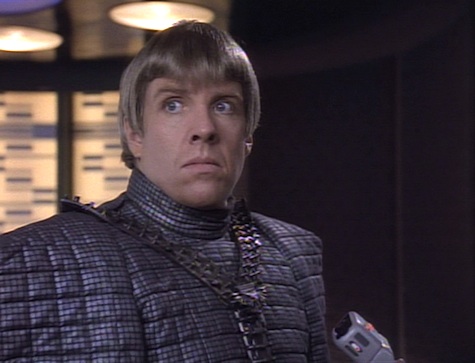
DeSeve also explains himself: he found Romulan morality, their strict sense of what is right and what is wrong, very appealing as a youth.
On the Khazara, Troi meets with N’Vek in the cargo bay. The “cargo” is, in fact, Vice Proconsul M’Ret and his two aides. He’d been speaking out against Romulan policies, and feared he would be imprisoned. Spock set up this escape route for his defection—N’Vek, Troi realizes, is part of Spock’s underground. Their plan is to rendezvous with a freighter (the same one DeSeve said the Enterprise needed to meet up with) and transfer Troi and the cargo carriers to it.
Troi joins Toreth and her senior staff for dinner, entering in the middle of a war story in which Toreth got a commendation—and in which the intelligence officer was executed. Toreth then pokes at Rakal with a stick some more, eventually revealing that her father was arrested in the middle of the night by the Tal Shiar for speaking his mind.
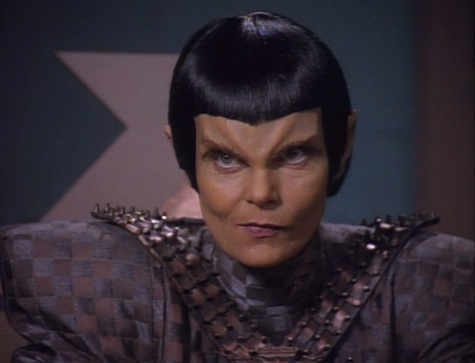
The Khazara rendezvouses with the freighter. Troi senses that the captain of the freighter is lying and has no intention of fulfilling the mission for which he was paid. N’Vek then overreacts by destroying the freighter, and saying that Rakal gave the order. Toreth is furious at this subverting of her authority, but Troi recovers from her shock at N’Vek’s actions and slaps Toreth down, pointing to the insignia on her neck and reminding Toreth that she is the primary authority on the ship. She orders the cloaking device engaged and orders Toreth to hold position and wait.
The Enterprise arrives at the rendezvous, but nobody’s there. (Because the freighter was just destroyed.) DeSeve tells Picard and Worf that the freighter is an Antares-class ship that couldn’t be more than fifteen light-years away, since they would have had to take on the cargo in the last day in order to make this rendezvous.
On the Khazara, Troi is pissed. N’Vek reveals Plan B: go to a Federation base. As a Starfleet officer, Troi can provide the access codes for the gravitic sensor net so they can enter Federation territory safely.
When Troi gives the order to go to the base (saying that she recognized the freighter captain as a known Federation spy) Toreth is—surprise!—not happy with her new orders, but follows them after taking a few more shots at the Tal Shiar.
They proceed to the bridge, and then they detect the Enterprise—which changes everything. For one thing, it helps sell Troi’s line that the freighter captain was a Federation spy. It also provides a much easier place to send the cargo.
The Enterprise is examining the debris of the freighter, and Data determines that it is indeed an Antares-class freighter, and it was destroyed by a Romulan ship, and not that long ago. Riker orders red alert.
Troi wants to send the cargo to the Enterprise, but N’Vek wants to stick with the original plan. Troi rightly points out that the original plan was toasted as soon as he blew up the freighter. She forces him to find a way to let the Enterprise track the Khazara even while cloaked—initially, he refuses, but Troi threatens to tell Toreth that he’s a traitor unless he starts listening to her for a change.
Data detects an intermittent distortion that DeSeve verifies could be a cloaked ship that’s having a minor engine fluctuation. Picard orders McKnight to change course to follow the distortion. Meanwhile, Toreth realizes that the Enterprise can track them somehow—to test whether or not that’s true, she maneuvers the Khazara right under the Enterprise’s nose. When the Enterprise backs away, Toreth puts the ship on battle stations.
Troi orders battle readiness ceased. Speaking derisively of the military’s tendency to use violence when discretion is required, she removes Toreth from command (threatening the families of anyone who disobeys her), and then explains her plan. Rather than decloak and fire upon them immediately when the Enterprise is battle-ready, she instead will propose a diplomatic solution, and get the Enterprise—who wish to avoid war—to lower their shields so they can be destroyed.
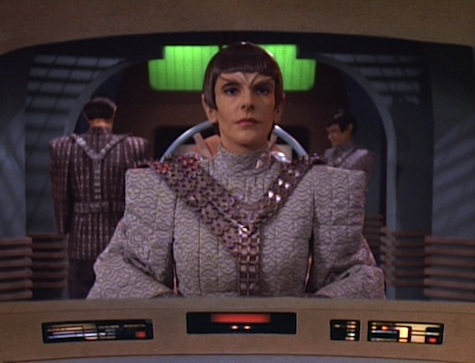
The Khazara hails the Enterprise, and when “Major Rakal of the Tal Shiar” comes on the screen it’s a huge test of everyone’s poker face. Picard plays along, asking if the major can shed any light on the freighter attack. Troi explains that the previous commander fired on the freighter without authorization and has been removed from command. She offers to beam over to discuss the situation, and requests that the Enterprise lower their shields for transport.
After she signs off, Picard orders the shields lowered, and then Troi orders N’Vek to fire on the Enterprise—but it’s a low-power shot that hides a transporter beam, which deposits M’Ret and his aides onto the bridge. DeSeve recognizes them immediately, and Riker summons a medical team, while Picard raises shields again. N’Vek claims the disruptor power is fluctuating for some reason, but Toreth pushes him aside and sees that it was sabotaged in order to hide the transporter. Toreth’s pilot determines that the transport originated in the cargo bay, at which point Toreth realize that Rakal and N’Vek are traitors. The pilot kills N’Vek and then points his disruptor at Troi until Toreth can disarm her. The commander then orders the ship to cloak—which requires them to drop the shields, at which point the Enterprise can beam Troi over and bugger back home.
M’Ret and his aides are safe, Troi gets her real face back, and Toreth is probably really confused as to what happened.
Can’t We Just Reverse the Polarity?: It’s established in this episode that Romulan ships use a quantum singularity to power their warp drive. (This is why the Romulan warp core imploded, rather than exploded, in “The Next Phase.”)
Thank You, Counselor Obvious: Interestingly enough, the original story by Rene Echevarria called for Crusher to be the one kidnapped and impersonating Major Rakal, but it became evident that Troi’s empathic abilities made her better suited to the task.
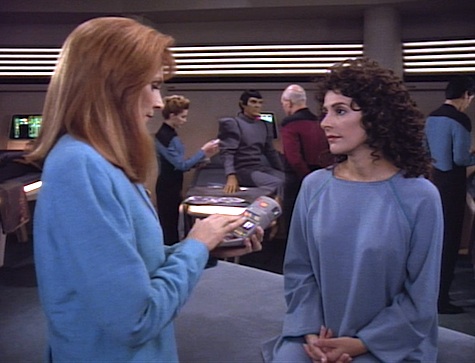
There is No Honor in Being Pummeled: This episode marks the debut of Worf’s longer hair, tied back in a ponytail (and also with a braid in there), a look he would retain for the rest of the series, on Deep Space Nine, and in all four TNG films.
In the Driver’s Seat: Ensign McKnight is seen flying the ship for the first time since “In Theory,” and for the final time on the air. Meanwhile, Toreth’s pilot never gets a name, but he totally saves the day from the Romulan perspective, as he tracks the transporter beam and kills N’Vek, saving his commander’s life.
I Believe I Said That: “Agonize all you want. But don’t let it get in the way of our plan.”
“You don’t have a plan anymore!”
N’Vek trying to keep Troi focused, and Troi not especially willing to play along with that.
Welcome Aboard: Scott MacDonald had just appeared on the previous week’s episode of Deep Space Nine as Tosk in “Captive Pursuit” before playing N’Vek here; those two were his first roles as an actor, and he would go on to play Ensign Rollins in Voyager’s premiere episode “Caretaker,” Goran’agar in DS9’s “Hippocratic Oath,” and the recurring role of Dolim on Enterprise. Meanwhile, this is Carolyn Seymour’s third role on TNG, and her second time playing a Romulan shipmaster, having played Taris in “Contagion”; she was also Mirasta Yale in “First Contact,” and will play the holonovel character “Mrs. Templeton” in two episodes of Voyager. Barry Lynch does excellent work as the defector DeSeve (he’ll also appear in several Trek video games), and Pamela Winslow returns again as McKnight.
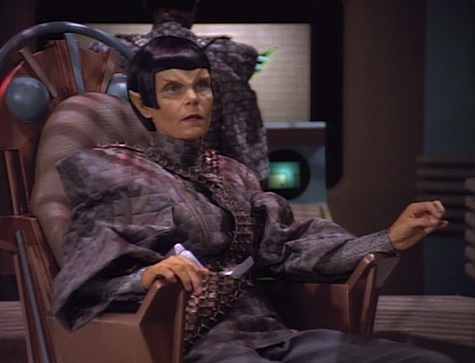
Trivial Matters: This episode serves as a sequel to “Unification” and “Unification II,” continuing the theme of Spock’s underground movement among the Romulans, without having to actually bring Leonard Nimoy back. The movement will next be referenced in the 2009 Star Trek. (Apparently, Michael Piller briefly floated the notion that the cargo was Spock himself, but when they opened the stasis chambers, he wasn’t there, and the dissidents who were smuggled in said that he didn’t make it. But they couldn’t kill a major Star Trek—indeed, the major Star Trek character—off-camera like that.)

Commander Toreth appeared again in two novels, Vulcan’s Soul: Exodus by Josepha Sherman & Susan Shwartz and your humble rewatcher’s A Singular Destiny.
The Tal Shiar name was chosen by Naren Shankar as a deliberate variant of tal-shaya, a Vulcan method of breaking someone’s neck, established in “Journey to Babel” on the original series.
Toreth makes a reference to a tachyon detection grid, like the one used in “Redemption II.”
Susan Shwartz wrote a sequel to this episode from DeSeve’s perspective in her short story “Turncoats” in the TNG anthology The Sky’s the Limit.
Make it So: “Your opinion of the Tal Shiar is quite clear, Commander.” There’s a tiny issue I have with this episode that I want to get out of the way: what language is Troi speaking when she’s on the Khazara?
Language is an issue that Star Trek mostly avoids like the plague, with vague references to universal translators that work like magic. A Deep Space Nine episode (“Sanctuary”) addressed the situation more directly, but that episode raised more questions than it answered. When Riker served on the Pagh, they made a point of having the Klingons speak the human language for Riker’s sake (which was silly, but at least it addressed the issue without having to have an entire episode with subtitles and forcing the actors to wrap their lips around Klingon). Here, Troi is undercover, so she has to be speaking the Romulan language, especially when she’s dealing with Toreth and the rest of the non-N’Vek crew.
It’s only an issue because of one of the episode’s (many) nice touches, to wit, Barry Lynch’s initial scenes as DeSeve where he struggles with English, as you would expect from someone who hasn’t spoken it in two decades. But if that’s the case, then Troi simply must be speaking Romulan—probably with an accent (hell, she speaks English with an accent). You’d think someone as observant as Toreth would notice that….
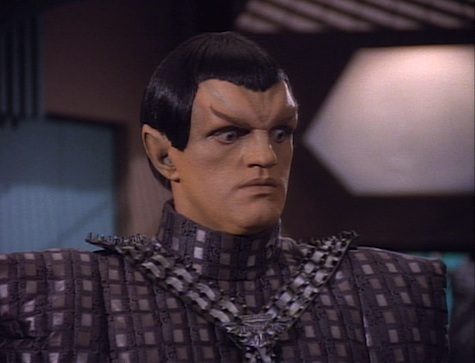
Still, it’s a minor complaint (albeit one that remains a sore point on all of Trek, even on Enterprise which went to the trouble of having a linguist on board and still mostly dodged the issue or dealt with it poorly). Overall, this is a superb episode, a great vehicle for Marina Sirtis, a nice sequel to the Spock two-parter, and a fascinating look at the Romulans as people from a variety of perspectives. Toreth in particular is a complicated individual, justifiably proud of her military record, and obviously a patriot and a devoted citizen of the empire—but not an unquestioning one, as she doesn’t think highly of the Tal Shiar (with good reason, given what happened to her father). For that matter, the character of DeSeve is fascinating, a type of person you rarely see on Star Trek, and a nice insight into the larger tapestry of life in the 24th century.
What I especially admire about this episode is the way that DeSeve’s internal conflict mirrors that of the episode. He refers to a moral certainty that was appealing to him as a youth, but as he grew older he realized that it was far more complicated than that. So too with the players in this episode, as the truly moral and sympathetic character is Toreth, the nominal antagonist, whom Troi has to maneuver around when she isn’t actively sabotaging her command and threatening her. A lot of what Toreth says are things Troi would likely agree with were she allowed to be herself. Meanwhile, N’Vek is a cold-hearted, murdering bastard—but he’s the one who’s actually on the side of the angels, more or less.
Plus Sirtis kicks seventeen kinds of ass here, modulating beautifully from compassionate Starfleet officer to fascist bitch on wheels. What’s especially fun is when bits from one bleed into the other: when “Rakal” acts quiet and polite, first when she meets Toreth before she settles into the role, and again when she asks the pilot how many people were on the freighter; and when Troi gets medieval on N’Vek’s ass to get him to let the Enterprise know where they are. It’s a nice next step for the character, after she was thrust into command in “Disaster.”
The climax is a little bit anti, but it also all makes perfect sense. It’s been long established that Romulan ships are unshielded when cloaked, so the Enterprise beaming Troi off once the Khazara cloaked worked just fine. Besides, the tension here wasn’t about physical action.
Warp factor rating: 8
Keith R.A. DeCandido is not at the World Fantasy Convention this weekend. So there.










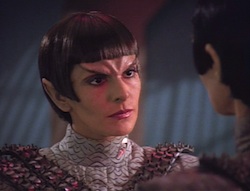
As I read this whole writeup my brain kept processing that Romulan’s name as “DeSteve”.
I’m going to set aside the question of language (because Trek always does) and ask a different question. If the original Enterprise could spot a single Vulcan on a bird of prey full of Romulans at transporter range, is there no technology 80 years later to detect a human/betazoid hybrid standing next to you? And wouldn’t the fascist and paranoid Romulans, who successfully disguised a Romulan as a Vulcan ambassador for 20 years, make a spy-scanner a routine piece of equipment? After all, unlike the multispecies Federation, any non-Romulan aboard a Romulan vessel is ipso facto a spy of some kind.
But ok, ignoring the nitpicks, this is probably the best Troi-centered episode, or at least the best one I can remember.
For whatever reason, this episode just didn’t gel with me. Might just be I was so outraged by the idea of a resistance group kidnapping and performing unauthorized medical procedures on a person and expecting them to go along with their plans. I find it hard to consider them ‘the good guys’, although maybe that’s the point.
Seriously, what a jerk, though. Did Spock really sanction that plan?
Also, I get that Troi is a Starfleet officer, but would she really have those kinds of access codes? I mean, she’s the Ship’s Counselor which isn’t really a military/strategic role. Although I guess she does have a rank of some kind…but it seems like those kinds of codes would only be given to really high up people. I have zero experience with military type things though so maybe I’m totally wrong – but it just seemed like a pretty risky assumption to make.
Also, I was hoping we’d see more of Torath, but it doesn’t sound like she comes back.
Jolan’tru Keith,
As a huge fan of the Romulans I love this episode. It gives, in 40+ minutes, so much depth to the race just with Commander Toreth (and Carolyn Seymour is brilliant in the role). Troi is wonderful in this episode, and shows that with a good part her character is interesting and also no shrinking violet. So much to love with this one.
If it’s okay for me to ask, did Toreth continue to grow in the novels she appeared in? I find myself wondering if she remained an outspoken near-heretic to the Romulan ideals. Seems that she’d be the perfect person for Spock to be looking for in the first place, somebody who is devoted to the Romulan race if not the ideals of the current politicians.
I loved this episode because it is one of the ones that shows that the Romulan Empire has nuance – sure it’s a facist police state, but there is dissent! In fact, I waas sort of grooving on the additional detail that was supposed to be added in Star Trek Nemesis – of course the Romulans would have consitutuent races, maybe as a labor class or something, and I was really hoping to get a glimpse of their government instead of the dreck they showed us.
Superficial as I am, I do shake my head at the costuming choice for DeSeve when he later shows up in “Federation Civilian” clothes – it’s some awful biege jumpsuit that is just poorly fitting and unflattering.
I also seriously thrill when Caroline Seymour delivers her withering dismissal at “Major Rakal,” something about how “your kind, Major Rakal, will be the death of us all.” Too bad we never saw more of Commander Toreth.
This is one of the few TNG-era Romulan episodes that does much for me; generally I found their treatment of the Romulans either boring, cartoony, or both, but this episode is an exception, bringing a lot of nuance and dimension to the Romulans (though, gods, that awful hair and clothing!). It was also a strong Troi episode, forcing her out of her comfort zone and letting her be impressive by adapting so well (and she looked surprisingly good in that Romulan makeup, even pulling off the haircut — though it seems she had just straight bangs instead of the usual downward peak).
There are, of course, some conceptual problems. Why not kidnap a Vulcan Starfleet officer instead of Troi? Would’ve been an easier imposture. Though to the point raised in comment #2, I’d suggest that if alien-detecting sensors were used, then spies would naturally develop ways of spoofing those sensors with false biosigns, metabolic alterations, and so forth. I can buy that it could be done, though I wonder why it had to be.
As for the language, given Troi’s responsibilities in diplomatic and contact situations, I would assume that studying alien languages is part of her job; remember how she taught Picard the Jarada greeting in “The Big Goodbye.” Since the Romulans are a major power that Starfleet often had dealings with, I bet Deanna would’ve managed to become fairly conversant in their language by this point, more than five years after first encountering them. As for the accent, I’m sure there are multiple different accents among the Romulans; they are an empire, after all, and thus presumably have subjects living on a number of different planets.
I’m surprised that this and Tosk were Scott McDonald’s first TV roles, since he was impressive in both (especially as Tosk). As for Carolyn Seymour, she was quite impressive too. Unfortunately the writers misremembered the events of “Contagion” and believed that Seymour’s previous Romulan commander character, Taris, had been killed. It would’ve been nice if they’d realized they could bring back the same character.
One of my favorite things about this episode is the musical score by Don Davis, his only contribution to Trek. As with a lot of first-time TNG composers, his score was much richer and more melodic than the usual sonic wallpaper Rick Berman favored, and it really gave the episode some added intensity. (The score is available on LaLa Land Records’ ST:TNG Collection Volume One box set, and I’m very glad to have it.)
Jack of Midworld: In Articles of the Federation, I established that, following Nemesis, the Romulan Empire had a schism, dividing into the Romulan Star Empire and the Imperial Romulan State, the latter led by Donatra (the ship commander played by Dina Meyer who helped the Enterprise in Nemesis). In A Singular Destiny, I established that Toreth was tapped to head up Donatra’s military.
—Keith R.A. DeCandido
I actaully liked this episode on rewatch much more than I liked it originally. Perhaps, like DeSeve, I’ve matured enough that my views on some things have changed.
I was very pleased to see such a strong performance out of Marina Sirtis, but as I’ve said before, she is a much better actor in a bad or tough-gal role. I’ve often wondered how Tasha Yar would have worked out portrayed by her. As for the uniforms, my partner walked through the living room while I was watching and he just didn’t understand the boxy clothing the Romulans wear, considering they’re close to human body shape and size. I just wonder if they had to raid the Dynasty wardrobe department to find that many shoulder pads.
@9,I’d suggest that if alien-detecting sensors were used, then spies would naturally develop ways of spoofing those sensors with false biosigns, metabolic alterations, and so forth. I can buy that it could be done, though I wonder why it had to be.
One of the great things about the concept for RHW’s Andromeda is that ships were full of hostile nanotechnology that would immediately invade and try and disable intruders, and that said intruders would equip themselves with countermeasures before boarding an enemy vessel. I’m not sure they ever did much with the concept though, like so much else about that show.
I do like the idea that spies would be implanted with transponders to throw off false biosigns. Writers of spin-off books seem to have much better ideas, or at least more room to play with them, than the TV writers.
I had just assumed the Romulan commander was the same character the actress had played before. I think I’ll just go ahead and keep thinking that’s the case.
This episode leaves me with some nagging unresolved questions, but the only one that matters is “Why didn’t this episode come sooner in the TNG run so we could have gotten more like it and less like… Well, any other Troi episode?”
krad – I love continuity and character arcs so I love the fact that a one-off character with such potential actually gets to, well, make it big.
My biggest problem with this episode is that it’s the first time we’ve gotten an extensive look at the interior of a TNG-era Romulan ship, and they give us the blandest sets possible. The Klingons, the Cardassians, even the Pakleds had interesting, atmospheric ships that look like they’re the product of a culture completely different from the Federation. The Romulans just have funky looking chairs and consoles plopped about the bridge at random.
I still much prefer Diane Duane’s Romulans — Rihannsu — and wish they were canon instead of the show stuff. None of the shows, much as I love them, had anything like the nuance and depth and passion of Duane’s Romulans.
I always liked this episode too, and for all the reasons others have been saying, about adding nuance to the Romulans. I feel like I’m very fascinated by the Romulans, even though I wouldn’t stand behind most of their policies in real life. I’m always excited by episodes such as this where we get to see into their society, or onboard their ships (from a design perspective) or we get a scene on Romulus. I always cheered for episodes or movies where efforts were made to extend the olive branch–I always believed that there could eventually be peace between the Federation and the Empire–but I guess that was hinted at even in “Balance of Terror” with the “in another universe we could’ve been friends” line. The Romulan stuff was the interesting part of Nemesis for me. I especially liked what DS9 did with the Romulans after they joined the war–how you had sympathetic Romulan characters, or else just smooth, calculating ones.
I think in some ways, the Romulans are very human for a Trek race. They’re a very passionate people, and as DeSeve said, moral–though I think their morals are often misguided. I think the problem with the Romulans is that they are too deceitful and untrusting too often, though they’ve shown the ability to overcome that. I think the split from Vulcan is very interesting–the power of Vulcan emotions were threating to destroy them as a race, so Surak’s idea was to supress them completely, while the Romulans wanted nothing to do with this. But for as passionate as Romulans are, their emotions in general seem more tempered than Vulcan emotions, so it seems like they were successful in learning how to integrate them. Romulans seem to have lost their telepathic abilities, though, and I wonder if that might have something to do with it. Obviously, the negative quality of Vulcan emotions that Romulans retained is the overly militaristic attitude.
Well that’s enough about that. @6 LadyBelaine: I totally agree with you about DeSeve’s civilian outfit. Not very flattering.
@7 CLB: Would a kidnapped Vulcan be a good choice? Do you think a random Vulcan would be able to feign the emotion needed as readily? We’ve seen Vulcans who were able to become “human” enough in this regard to do things like this (e.g., Spock; T’Pol) but these always seemed to be special cases. Just a thought.
Oh, one more thing: I also liked Troi’s journey portrayed here. I wonder if she got a special commendation from Starfleet for her duty here.
I have to agree with everyone else, Carolyn Seymour is excellent in this episode (and, in fact, in all of her Trek appearances).
Is it just me, though, or does Marina Sirtis bear a very strong resemblance to Tyne Daly when she’s under the Romulan prosthetics?
@16,
Hope she got some hazard pay too…
In the “derp!” realm, I totally forgot to mention Susan Shwartz’s sequel to this episode, the short story “Turncoats” in The Sky’s The Limit, the TNG 20th anniversary anthology. It’s been added to the “Trivial Matters” section.
—Keith R.A. DeCandido
Not a huge fan of this episode. I think we give Sirtis too much credit when she isn’t awful and I could never get past the setup – just never could suspend my disbelief. Middle of the warp scale for me.
I missed this because of the hurricane (my power was off for a week and I had no internet access). I just want to say that this is the episode that made me notice that Sirtis had learned to act. She’s magnificent in this episode.
On initial viewing, it felt like “The Underground Railroad in Space and with Bad Incidental Music”, but kudos to Ms. Sirtis for getting to do something different for a change.
Troi was often spouting the obvious, and when Guinan came on board, Guinan got to do the stuff that would have been natural for Troi (though Whoopi Goldberg’s acting made Guinan far more memorable, and while the trope is similar, trying to envision Troi doing Guinan’s dialogue just doesn’t work.)
as always, Carolyn Seymour puts in a fantastic performance. “Just a job” or not, every role she’s played in TNG feels alive and natural.
Ms. Sirtis, to me, was never a bad actress (she even vied for “Dayna” in “Blake’s 7”), it was the quality of the scripts that were so banal. “He’s hiding something”. Well, duh!!
And, along with this episode, “The Ensigns of Command” is another great Troi story as she gets to do something natural with her character but it’s not parroting what the audience can figure out the moment the other character says it.
Brilliant episode, hard to believe it came right after that dreadful one with LeForge and the dog.
So much going on, so complex and intricately woven.
Watching Troi go through the gears of brutality in quick fashion was straight out of The Stanford Prison Experiment:
http://www.youtube.com/watch?v=760lwYmpXbc
A truly magnificent episode, one of my favorites in all of television. Marina Sirtis has always done bad very very good, and this episode is the very best of that lot.
I couldn’t have given a crap what language Troi was speaking on the Khazara. The tension in this episode is palpable, and I loved that this one showed that the so-called bad guys the Romulans actually have souls and feelings, even more so than any prior Trek episode, including “Unification” and “Unification II”. Despite being the “enemy”, you could totally sympathize with Toreth, who despite the experience with her father, remained a loyal soldier to the Empire. N’Vek’s “cold-heartedness” can be explained in the urgency, importance, and overall danger, of the mission.
I didn’t know the magnificent score in this episode was done by Don Davis of The Matrix fame. A wonderful score that made the episode all the more exceptional. (Thanks CLB for the info on how to get that score. I’m all over it now:) )
Just a truly great hour of television.
@lance – it’s the eyebrows. :) I thought this was one of Sirtis’ finest performances as Troi – and I agree Troi definitely kicked some ass and was really light on her feet in adapting to the changing circumstances.
I like how the “Ship in a bottle” episode is rated higher than this one, plus both parts of “Chain of command”. I liked Regina too… but come on!
@27: Come to think of it, that is a flaw. A cloak, by definition, makes a ship undetectable to sensors. So how the hell can a transporter lock onto anything inside the cloak? It wouldn’t be able to scan it for dematerialization.
The one thing I always thought was missing from that bit was seeing Troi be beamed off the Romulan ship instead of just appearing on the Enterprise. It would have been really interesting to see the reaction of the Romulans as she’s beamed off the Khazara.
Wide and Nerdy & Christopher: All things being equal yes, but they had a sensor lock on Troi already, they just couldn’t beam her through the shields. So they probably still had the lock on her when the ship cloaked.
It’s a hand-wave, mind you, as Christopher is right, they should lose the lock as soon as the cloak engages….
—Keith R.A. DeCandido
@30: If they already had a lock, I’ll give them that. I tend to assume that a transporter works by quantum entanglement, since that’s a necessary part of the quantum teleportation process in real-world theory. So if the transporter were already locked onto her, it would remain entangled with her particles regardless of distance or lightspeed communication time. So raising a cloak and blocking ordinary signals — physically analogous to removing the object from visual or communications range — would have no impact on the entanglement and the lock would remain. It’s still a bit of a handwave, but close enough that I can live with it.
If I remember, the matter is simply energized into a matter stream. Its only the neural energy patterns or whatever that are quantum encoded (From that episode where the DS9 crew became tied into the holodeck as characters).
I would think that if their transporter worked by quantum entanglement, not even shields could block it (then again, they deal with quantum whatever regularly so who knows.)
@32: No, what you’re thinking of is the fact that the neural patterns are stored at quantum-level resolution, necessary to preserve all the information that defines a consciousness, whereas the physical pattern can be stored at a lower resolution. It’s like the difference between standard definition and high-def. Quantum entanglement is something entirely different. Real-life quantum teleportation theory requires quantum entanglement. It’s the only way around the Heisenberg Uncertainty Principle, so I assume it must be the basis of the “Heisenberg compensator” in the transporter.
And the quantum entanglement is just one part of the signal, per QT theory. In order to reconstruct the information, you need both the entanglement link and a conventional signal sent at lightspeed by radio or laser — or by subspace radio in Trek. The entanglement data is essentially the decryption key for the conventionally transmitted data.
I really like this episode b/c it showcased Troi as a grittier Starfleet officer that could be as hard as Worf under pressure. Where does the action take place? In neutral territory? If a Federation starship entered the Neutral Zone, it can be impounded and its crew taken as prisoners of war. If a Romulan warbird entered Federation space, there would be a BIG problem. Doesn’t really matter, just a question.
This episode was just meh for me. I think I had trouble getting past the disbelief of the setup, and the language thing did bug me for a second (although my brain handwaved it off like many things). It was nice to see Troi get to do something else. She was so accomplished in her role and quick thinking to rapidly changing situations she should become a lead diplomat. But I still didn’t quite buy it. Also when she was shouting about the Enterprise I was like “shhh, there are probably crew members walking right past the doors!” I did like getting to see more complete Romulan characters.
I would have watched an entire episode of Toreth going up against Picard. Slow speed every word a chess move style.
Back in the day, I actually assumed that Ensign DeSeve was a Romulan / human hybrid. I had no idea he was simply a human with a Romulan haircut
I didn’t remember this episode as well as others, which is a shame since it’s so great. Only two things bothered me, one more than the other: 1. Troi name checks N’vek as a hero to Picard, but says nothing about Toreth and how she is the kind of Romulan the Federation could make peace with. 2. That was unfortunate to me because I don’t see how Troi hasn’t signed Toreth and the whole crews’ death warrants. I know Toreth survives/thrives in the books, but wouldn’t the high command and Tals tear her and her crew to pieces to find out what happened? I’d assume the only saving grace would be the higher ups might want to keep the news of such a major defection quiet (tho that would indicate total liquidation of the crew, no?)
On that point, so we ever see any of the consequences of such big defections either in the Federation or in the Romulan Empire? That would be a major major blow to a country on earth – did the Federation reveal his existence and beam it back into Romulan worlds? Did the Tals try to sneak in and assassinate him? Things to think about.
I am really surprised about the praise this episode earned here, because I think it’s mediocre at best. Yes, we get some interesting insights into Romulan society and the friction between military and Tal Shiar, and I enjoyed Carolyn Seymour’s portrait of the ship’s commander immensely. But the episode is ruined by the totally implausible story. Spock and the underground movement devise a plan to set up an escape route for top level members of the government which depends on the opportunity of abducting a starfleet officer at just the right time? Serioulsy? Then Troi is drugged, abducted, surgically altered and thrown into an alien and hostile environment without any training or briefing, and she fulfills her role perfectly from the first minute because she is just that awesome? How did she come aboard while she was unconcious? Did no one bother to check her credentials just because she wore a Tal Shiar uniform? Later on we learn that Starfleet now has methods of detecting cloaked warbirds (‘gravitic sensors’) which have never been mentiond before and will never be mentioned again. But luckily Troi as a starship’s counsellor, who is in no way involved with ship’s operations, has the top secret access codes for this sensor net. Really? And in the end, after this far-fetched and contrived plan succeeds, Picard and his officers are convinced that they now have opened an escape route to be used by many more dissidents. Seriously? How could this plan succeed a second time after the Tal Shiar investigate the events and put a stop to the transport of unidentified cargo on Romulan military vessels? Sorry, but I don’t buy any of this. My rating would be 5 at most.
@38/ThomasE: “Later on we learn that Starfleet now has methods of detecting cloaked warbirds (‘gravitic sensors’) which have never been mentiond before and will never be mentioned again.”
That part’s actually quite realistic. As I’ve said before, cloaking devices can’t be a single unchanging technology, because as soon as one power invents a new form of stealth, its enemies are going to start seeking ways to penetrate it, and once that happens, it’ll be useless until another new form of stealth is invented. So it makes sense that any given cloaking system or any given countermeasure will only be usable for a limited amount of time before it’s countered in turn. Which is a handy way to reconcile all the seeming inconsistencies in ST’s portrayal of cloaking tech.
@39/Christopher Bennet: You are right, I concede that the Federation might have discovered a new method of detecting cloaked ships since the events of “Redemption”. But there is no way that a counsellor would have the codes to deactivate these sensor at the Romulan border.
This episode actually made me cry. When the secret agent uses the starship to destroy the mercenary ship, and the Romulan captain is outraged her ship was used to kill. That really got to me. It changed everything I knew about the Romulans.
Probably an incorrect question in our day and age, but toward the beginning, an officer on the bridge of the Khazara responds to Commander Toreth with the phrase, “Yes, sir.” Is this the appropriate response to a woman commander? Wouldn’t a different form of address make more sense?
@42/Jazzmanchgo: There’s a lot of precedent in Trek for using “sir” as a gender-neutral address, and it’s arguably not incorrect to do so. Etymologically speaking, “sir” is derived from Latin senior (elder) and is thus not intrinsically a masculine term, despite being conventionally used that way.
So on the first season of Picard, they revealed that the Romulans have separate names that they apply when addressing different groups of people. By that standard, I think it’s fair to speculate that both of Carolyn Seymour’s Romulan commanders are the same, with “Toreth” being the name that she uses amongst her own people and “Taris” being the name the she uses when addressing foreigners,
I enjoyed this one a lot, particularly on the strength of Commander Toreth, although it took me some time to discount the very dated appearance of the Romulan outfits and what looked like some dodgy makeup at times. Yes, the plot has holes, but once I accepted the weirdness of the setup I was away.
Watching this having started on DS9 it’s interesting to see more shades of moral complexity and conflict in TNG; I *loved* Deseve and the possibilities he represented. Ah well.
Just imagine if some demented early 1990s commissioning executive had signed off on spinning out Toreth and crew into a parallel or rather inverted TNG, within the same continuity; same sets seen here, same actors, just to see how far you could make it go. Yeah, it would have flamed out within a season, so what, we can dream…
“to wit, Barry Lynch’s initial scenes as DeSeve where he struggles with English, as you would expect from someone who hasn’t spoken it in two decades”
Huh? I would’ve loved to see that but I don’t remember — nor can I find in the online transcript — anything to that effect other than the moment of him mistakenly referring to Picard as Commander rather than Captain.
Speaking of speaking, however, I find it hard to believe Troi and N’Vek were talking so freely at such volume without being overheard. Frankly, Romulans are presented as so conniving, suspicious, and security-conscious by nature or habit that, more broadly, it’s hard to believe that conversations aren’t monitored all over the place as a matter of course.
#46
It’s not so much in the dialogue itself but in how Lynch delivers his lines, ie slow and halting. See also Robert Redford’s performance in the third act of Jeremiah Johnson. “It’s been a long time since I had someone speak English at me.”
Arben: Hayseed is correct, and it’s the sort of thing that wouldn’t show up in a transcript. Lynch is hesitant and pausing to remember the right words to use.
—Keith R.A. DeCandido
Weird. I feel like that’s very much the kind of thing I would have noticed and, like I said, appreciated.